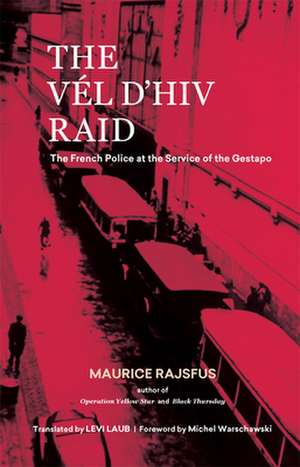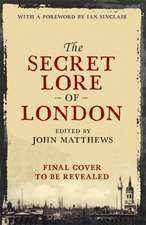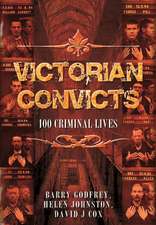The Vél d'Hiv Raid: The French Police at the Service of the Gestapo
Autor Maurice Rajsfus Traducere de Levi Laub Cuvânt înainte de Michel Warschawskien Limba Engleză Paperback – 12 sep 2017
Beginning in the early morning hours of July 16, 1942, and lasting for two days, the French police went beyond Nazi ordinances and took it upon themselves to arrest and imprison more than 13,000 Jews at a Paris sporting arena, the Vélodrome d'Hiver. For most of the Jews, this detention without water, food, or sleep was the first horrific step toward death in the concentration camps. This uniquely detailed study of the roundup offers the only contemporary analysis of both the precursors and the aftermath of the events of those two days. Using recently opened police files, Maurice Rajsfus details the internal organization of the police, showing the mechanisms of this raid in particular and of raids in general, making the book an indispensable micro-history of the Holocaust. A companion piece to Rajsfus's Operation Yellow Star / Black Thursday (DoppelHouse Press, 2017), The Vél d'Hiv Raid includes witness and police reports, shocking excerpts from the collaborationist press, and speeches by contemporary French politicians whose official apology is still not complete and terribly overdue.
With a foreword by Israeli activist and author Michel Warschawski.
Maurice Rajsfus (b. 1928), a former investigative journalist for Le Monde, survived the Vél d'Hiv roundup. He has written thirty books, including many examining the Vichy regime and its legacy in French police culture. Several of his books about his World War II experiences are the basis of a YA comic published by Tartamudo editions, as well as a theatrical production and a film. He lives in Paris with his family.
With a foreword by Israeli activist and author Michel Warschawski.
Maurice Rajsfus (b. 1928), a former investigative journalist for Le Monde, survived the Vél d'Hiv roundup. He has written thirty books, including many examining the Vichy regime and its legacy in French police culture. Several of his books about his World War II experiences are the basis of a YA comic published by Tartamudo editions, as well as a theatrical production and a film. He lives in Paris with his family.
Preț: 78.14 lei
Nou
Puncte Express: 117
Preț estimativ în valută:
14.95€ • 15.65$ • 12.44£
14.95€ • 15.65$ • 12.44£
Carte disponibilă
Livrare economică 10-24 martie
Preluare comenzi: 021 569.72.76
Specificații
ISBN-13: 9780997818468
ISBN-10: 0997818468
Pagini: 112
Dimensiuni: 127 x 178 mm
Greutate: 0.16 kg
Editura: DoppelHouse Press
Colecția DoppelHouse Press
ISBN-10: 0997818468
Pagini: 112
Dimensiuni: 127 x 178 mm
Greutate: 0.16 kg
Editura: DoppelHouse Press
Colecția DoppelHouse Press
Notă biografică
Maurice Rajsfus (b. 1928) is an activist and former investigative journalist for Le Monde. He is the author of 30 books, including many examining the Vichy regime and its legacy in French police culture. He has also written about Drancy concentration camp (Drancy, un camp de concentration très ordinaire, 1941-1944; Le Cherche midi, 2005) and Israel-Palestine, as well as co-authored several illustrated books about history. From 1994-2012 Rajsfus created and circulated "Que fait la police," a "Cop Watch" bulletin with press clippings detailing human rights abuses by French police and detailed in his book Je n'aime pas la police de mon pays – L'aventure du bulletin Que fait la police ? (1994-2012) (Libertalia, 2012). Other well-known works by Rajsfus include Les Silences de la police – 16 juillet 1942-17 octobre 1961 (l'Esprit frappeur, 2001), Le Chagrin et la colère (Le Cherche midi, 2005), Mai 68 sous les pavés, la répression : Mai 1968 - mars 1974 (Le Cherche midi, 1999), and Candide n'est pas mort (Le Cherche midi, 2008), which tackles the thorny issue of the anti-Semitism and legacy of France's famous author, Candide. Several of his books about his experiences during WWII have been brought together to form the basis of a YA comic (Tartamudo editions) as well as a play written and directed by Philippe Ogouz, which was then adapted for film in 2010, Souvenirs d'un vieil enfant: La rafle du Vel' d'Hiv (Memories of an Old Child: The Roundup of the Vel’ d'Hiv), directed by Alain Guesnier. Maurice Rajsfus lives in Paris with his wife, and has two sons as well as several grandchildren and great-grandchildren.
Levi Laub (b.1938) was born and raised in the Bronx. He is an activist and occasional translator. He worked with the Progressive Labor Party in the United States for 15 years mostly as an organizer of immigrant labor in Los Angeles and the California valleys. In 1963 Laub led a group of 59 students to Cuba via Prague, violating and challenging the travel ban for US citizens that was in place at the time. Upon his return to the United States, Laub was called before the House Un-American Activities Committee. Riots broke out in the hearing room when Capitol police were called in to remove Laub and his supporters. Within the month, Laub and three other organizers of the Cuba trip were indicted in Federal Court for violating the Travel Ban. In U.S. v. Laub, the Supreme Court ruled in his favor, considering it unconstitutional to disallow American citizens their right to free movement. He met Maurice Rajsfus in Paris while doing research into communist militancy in the French Resistance, about which Rajsfus wrote a book entitled Next Year, The Revolution.
Michel Warschawski (b.1949) (Mikado) is an Israeli anti-Zionist peace activist and journalist. He was born in Strasbourg, France, where his father was a rabbi. He moved to Jerusalem for Talmudic studies at age 16 and later completed a degree in philosophy at the Hebrew University of Jerusalem. He led the Marxist Revolutionary Communist League (Matzpen, Israeli Section of the Fourth International) until its demise in the 1990s, and co-founded the Alternative Information Center (AIC), an organization uniting Israeli and Palestinian anti-Zionist activists. His books include On the Border (South End Press) and Towards an Open Tomb - the Crisis of Israeli Society (Monthly Review Press).
Levi Laub (b.1938) was born and raised in the Bronx. He is an activist and occasional translator. He worked with the Progressive Labor Party in the United States for 15 years mostly as an organizer of immigrant labor in Los Angeles and the California valleys. In 1963 Laub led a group of 59 students to Cuba via Prague, violating and challenging the travel ban for US citizens that was in place at the time. Upon his return to the United States, Laub was called before the House Un-American Activities Committee. Riots broke out in the hearing room when Capitol police were called in to remove Laub and his supporters. Within the month, Laub and three other organizers of the Cuba trip were indicted in Federal Court for violating the Travel Ban. In U.S. v. Laub, the Supreme Court ruled in his favor, considering it unconstitutional to disallow American citizens their right to free movement. He met Maurice Rajsfus in Paris while doing research into communist militancy in the French Resistance, about which Rajsfus wrote a book entitled Next Year, The Revolution.
Michel Warschawski (b.1949) (Mikado) is an Israeli anti-Zionist peace activist and journalist. He was born in Strasbourg, France, where his father was a rabbi. He moved to Jerusalem for Talmudic studies at age 16 and later completed a degree in philosophy at the Hebrew University of Jerusalem. He led the Marxist Revolutionary Communist League (Matzpen, Israeli Section of the Fourth International) until its demise in the 1990s, and co-founded the Alternative Information Center (AIC), an organization uniting Israeli and Palestinian anti-Zionist activists. His books include On the Border (South End Press) and Towards an Open Tomb - the Crisis of Israeli Society (Monthly Review Press).
Cuprins
Foreword by Michel Warschawski
Introduction: THE UNVARNISHED TRUTH
PRELUDES TO THE GREAT RAID: THE PREPARATIONS OF THE VICHY GOVERNMENT
THE PREPARATION FOR THE RAID
ARMED VIGIL
THE RAID
- The behavior of the police
- Suicides
- Wanting to do a good job
- Public opinion
- The raids will continue
- The malcontents
TO THE VÉL D¿HIV
- Escapes
- The evacuation of the Vél d¿Hiv
THE DIRECTORS OF THE GREAT RAID and their Nazi interlocutors
WHAT THE PRESS WAS SAYING
WHO COULD PROTEST?
Conclusion: FOR THE RECORD¿
Appendix 1
ORGANIZATION OF THE GREAT ROUNDUP
The decrees issued by Émile Hennequin (Chief of the municipal police) on July 12 and 13, 1942
Appendix 2
FLYER TRANSLATED FROM YIDDISH DISTRIBUTED TO JEWISH IMMIGRANTS IN PARIS A FEW HOURS BEFORE THE ROUNDUP
FLYER TRANSLATED FROM YIDDISH DISTRIBUTED IN PARIS IN AUGUST 1942
Appendix 3
SPEECH BY JACQUES CHIRAC ON JULY 16, 1995 (Delivered at the ceremonies memorializing the roundup of July 16 and 17, 1942)
Introduction: THE UNVARNISHED TRUTH
PRELUDES TO THE GREAT RAID: THE PREPARATIONS OF THE VICHY GOVERNMENT
THE PREPARATION FOR THE RAID
ARMED VIGIL
THE RAID
- The behavior of the police
- Suicides
- Wanting to do a good job
- Public opinion
- The raids will continue
- The malcontents
TO THE VÉL D¿HIV
- Escapes
- The evacuation of the Vél d¿Hiv
THE DIRECTORS OF THE GREAT RAID and their Nazi interlocutors
WHAT THE PRESS WAS SAYING
WHO COULD PROTEST?
Conclusion: FOR THE RECORD¿
Appendix 1
ORGANIZATION OF THE GREAT ROUNDUP
The decrees issued by Émile Hennequin (Chief of the municipal police) on July 12 and 13, 1942
Appendix 2
FLYER TRANSLATED FROM YIDDISH DISTRIBUTED TO JEWISH IMMIGRANTS IN PARIS A FEW HOURS BEFORE THE ROUNDUP
FLYER TRANSLATED FROM YIDDISH DISTRIBUTED IN PARIS IN AUGUST 1942
Appendix 3
SPEECH BY JACQUES CHIRAC ON JULY 16, 1995 (Delivered at the ceremonies memorializing the roundup of July 16 and 17, 1942)
Descriere
A micro-history of anti-Semitism, xenophobia, police brutality, and terror.



